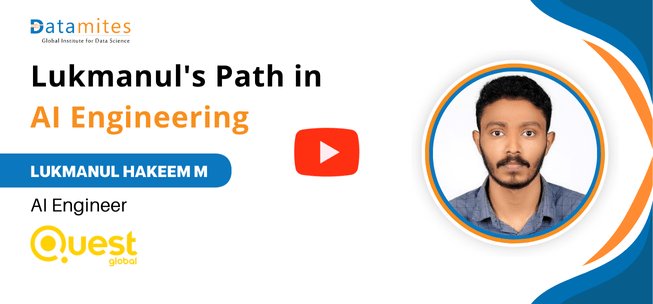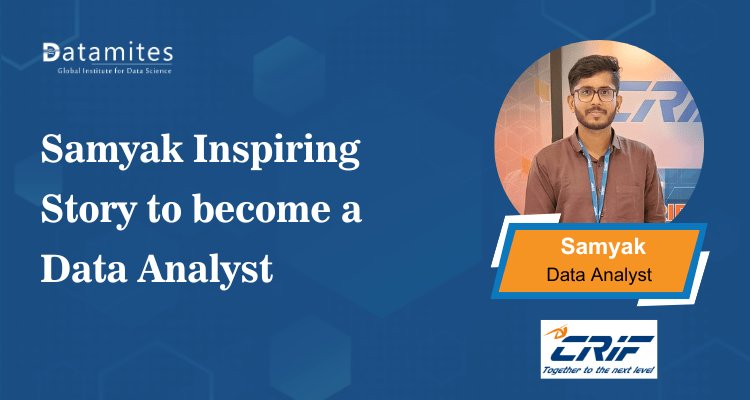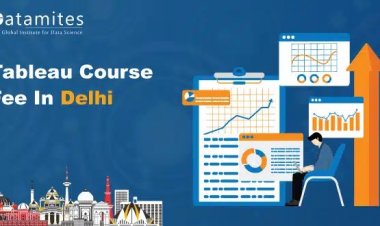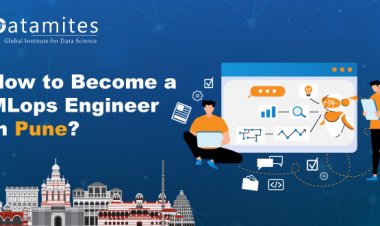Lukmanul's Path in AI Engineering
Explore Lukmanul's journey in AI Engineering, from learning foundational concepts to mastering advanced AI applications and building a successful career in the field.
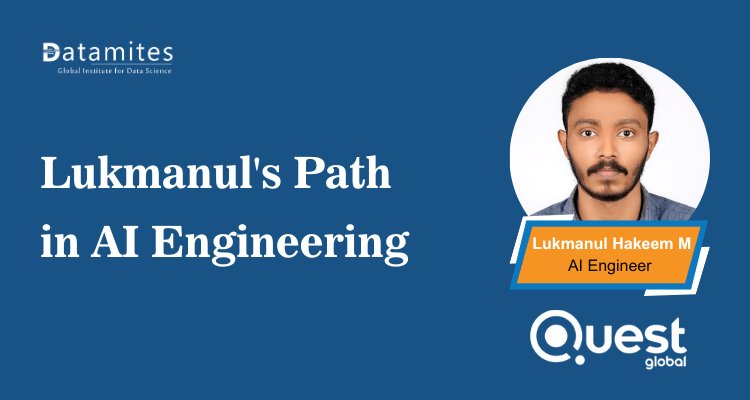
The field of Artificial Intelligence has become one of the most promising career paths in recent years, with countless learners upskilling themselves to enter this competitive industry. To help aspiring professionals understand the journey, challenges, and opportunities in AI, DataMites recently hosted an alumni talk with Lukman Hakim, a former student who is now working as an AI Engineer at Quest Global. In this insightful conversation, Lukman shared his personal journey from completing his B.Tech in Kerala, joining DataMites during the pandemic, pursuing a Master’s specialization in AI, to securing a full-time role in one of the leading global companies. His story is not only inspiring but also a roadmap for aspiring AI and data science professionals.
Exclusive Q&A: Lukmanul’s AI Engineering Journey with DataMites
In this exclusive Q&A, Lukmanul shares his journey from a B.Tech graduate to an AI Engineer at Quest Global. He talks about the challenges he overcame, the projects that shaped his skills, and the career lessons learned along the way. His experience offers valuable guidance and inspiration for aspiring AI engineers, data scientists, and professionals aiming to build a career in artificial intelligence.
1. Can you please introduce yourself to our readers?
Hello, I am Lukman Hakim, from Malappuram district in Kerala. Currently, I am working as an AI Engineer at Quest Global in Trivandrum. My journey into Artificial Intelligence began after my graduation when I enrolled in DataMites’ structured AI Engineer program.
2. What motivated you to join DataMites for your artificial intelligence journey?
After my B.Tech, my friends and I wanted to take up a short-term professional course to prepare for interviews. We explored multiple institutes in Bangalore, but DataMites stood out due to its structured curriculum and unique approach. This was during the pandemic (2022), and I believed AI offered both career stability and good salary prospects, which made me choose this path.
3. How did DataMites help you build a foundation in AI and ML?
Before joining, I had done some small projects like Titanic prediction and basic classification tasks. But at DataMites, the course was highly structured starting with mathematical foundations, moving into machine learning algorithms, and then focusing on Python libraries like NumPy and Pandas. This gave me a strong foundation to understand both theory and implementation.
4. What course did you enroll in at DataMites?
I enrolled in the AI Engineer course, which was divided into two phases:
- Data Science Course (6 months)
- AI Expert Course (2 months)
The placement support was excellent, with mock interviews, job fairs, and continuous encouragement from the team.
5. You also pursued a Master’s specialization in AI. How different was that from the DataMites course?
Great question! The DataMites course focused on making students industry-ready with coding, algorithms, and practical applications. In contrast, my Master’s in AI focused on research, theory, and deep conceptual understanding of ML algorithms.
If someone wants to get into the job market quickly, short-term courses like DataMites are best. But if one is curious about research and innovation, pursuing a Master’s is beneficial.
6. Were your classes online or offline at DataMites?
I joined the offline classroom session in Bangalore in October 2022. We had 3 classes per week, each lasting 2 hours, followed by assignments and capstone projects. The faculty, especially Kalpana Ma’am and Shubhangi sararkar, were very supportive and cleared all our doubts.
7. How much personal effort did you put into learning beyond classes?
I dedicated almost every non-class day to practicing coding, revising concepts, and working on projects. I also used the DataMites LMS platform for quizzes, recorded sessions, and additional tutorials, which really strengthened my knowledge.
8. Many students fear coding in AI. What was your coding experience like?
I had prior exposure to Python during B.Tech, so it was easier for me. However, I wasn’t familiar with advanced libraries like NumPy, Pandas, and scikit-learn, which I learned at DataMites. My advice is to pick end-to-end projects, work through them, and apply reverse engineering to understand each component.
9. Can you share your job application and interview experiences?
Yes. Before joining Rubixe (a DataMites partner company), I gave 3-4 interviews. Most recruiters tested coding via HackerRank challenges. At Rubixe, the process included a written test (Python basics, algorithms, package usage) followed by two rounds of interviews. Later, through my PG placement, I got an internship at Quest Global, which was extended into a permanent role.
10. How important were DataMites’ projects and capstones for your career?
Very important! I completed 4 capstone projects and 1 client project, which taught me the entire ML pipeline—data collection, preprocessing, visualization, feature engineering, and deployment. In interviews, I highlighted a computer vision project (object detection using YOLO), which impressed recruiters.
11. What tools and technologies do you use as an AI Engineer now?
Currently, I work on Python, Jupyter Notebook, Google Colab, OpenCV for computer vision, and NLTK/Transformers for NLP. During my internship at Rubixe, I also used AWS EC2 and SageMaker for cloud-based AI solutions.
12. What resume-building tips would you recommend for AI aspirants?
- Keep your resume concise (1-2 pages).
- Highlight skills and tools with projects where you applied them.
- Add your GitHub portfolio for recruiters to check your code.
- Tailor your resume for the specific job role (Data Science, Computer Vision, NLP, etc.).
13. Should students work on many projects or just a few?
It’s better to have a few strong, in-depth projects rather than many small ones. In interviews, recruiters often dig deep into your end-to-end project experience, so be prepared to explain your projects thoroughly.
14. How did you overcome challenges while preparing for artificial intelligence roles?
The biggest challenge was the competitive job market. I overcame it by:
- Practicing coding daily on platforms like HackerRank and LeetCode.
- Working on personal projects to gain practical exposure.
- Actively participating in mock interviews and job fairs at DataMites.
15. What final advice would you give aspiring AI professionals?
Be clear about your career goals whether you want a job quickly or pursue research.
- Build practical skills with projects.
- Continuously upskill with new tools like Hugging Face Transformers and Generative AI.
- Stay confident interviews are often guided by the projects you present, so choose wisely.
Refer to these articles:
- From Learner to Leader: Chandan’s Inspiring Journey as an AI Lead
- Junaid’s Path to MLOps Excellence: Data Meets Deployment
- From Fresher to AI Engineer – Darshan’s Success Story
Key Findings from Lukmanul’s Path in AI Engineering
Explore Lukmanul’s journey from a B.Tech graduate to an AI Engineer at Quest Global, where he honed industry-ready skills and hands-on expertise in real-world AI projects with guidance from DataMites. Here are the key takeaways from his story, outlined point by point:
- Lukman Hakim’s Background: Completed B.Tech in Kerala, pursued DataMites’ AI Engineer program, and is now an AI Engineer at Quest Global.
- Reason for Choosing artificial intelligence: Explore a career in AI Engineering, driven by strong demand, career stability, and attractive artificial intelligence salary opportunities, while gaining expertise in cutting-edge technologies.
- Why DataMites?: Chose the institute for its structured curriculum, strong faculty support, and placement assistance.
- Course Structure: AI Engineer course included Data Science (6 months) + AI Expert (2 months) with practical projects.
- Learning Experience: Classes (offline in Bangalore) were 3 days per week with additional self-study and LMS support.
- Master’s vs DataMites Course: DataMites focused on industry-ready skills and coding, while the Master’s program emphasized theoretical research.
- Projects & Capstones: Completed 4 capstones + 1 client project; computer vision (YOLO object detection) project stood out in interviews.
- Coding Skills: Strengthened Python, NumPy, Pandas, scikit-learn, and deep learning libraries.
- Tools & Tech: Uses Python, OpenCV, NLTK, Transformers, AWS SageMaker, Jupyter/Colab in his AI role.
- Interview Experience: Faced coding tests on HackerRank and multiple interview rounds; practical project knowledge was key.
- Resume Tips: Keep it concise, highlight skills with projects, and add a GitHub portfolio.
- Project Strategy: Focus on few detailed projects rather than many small ones; recruiters probe deep into real projects.
- Challenges Faced: Overcame a competitive job market through daily coding practice, projects, and mock interviews.
- Placement Support: DataMites offered mock interviews, job fairs, and mentoring, which helped him prepare.
- Advice for Aspirants:
Define your career goals (job vs research).
Work on practical, end-to-end projects.
Continuously upskill with emerging AI tools.
Stay confident during interviews.
Refer to these articles:
- How to Become Machine Learning Engineer in Mumbai?
- Artificial Intelligence Course Fee in Bangalore
- Is the Demand for Artificial Intelligence Still High in Chennai?
Lukmanul’s path is a powerful example of how structured training, real-world projects, and determination can shape a successful career in AI. His experience provides practical guidance for graduates entering the tech industry and professionals aiming to build a future in data science and artificial intelligence.
According to MarketsandMarkets, the generative AI market is set for remarkable expansion, expected to rise from USD 71.36 billion in 2025 to USD 890.59 billion by 2032, registering a CAGR of 43.4% throughout the forecast period.
DataMites offers a comprehensive artificial intelligence course in Bangalore, tailored for both beginners and working professionals. With training centers easily accessible to learners in areas like Kudlu Gate, BTM Layout, Marathahalli, and nearby regions, the institute ensures flexible schedules, expert mentorship, and dedicated placement support helping you confidently build or advance a career in AI.
Artificial Intelligence is transforming industries at a rapid pace, and cities like Bangalore and Chennai are emerging as prominent hubs for this innovation. Whether you are a student eager to dive into AI, a tech enthusiast seeking deeper expertise, or a professional looking to upskill, enrolling in the right program can unlock exciting career opportunities. Opting for a trusted artificial intelligence course in Chennai, with training centers easily accessible from areas like Guindy, Perungudi, and Anna Nagar, equips you with practical knowledge, hands-on tools, and the right guidance to succeed in today’s data-driven world.
